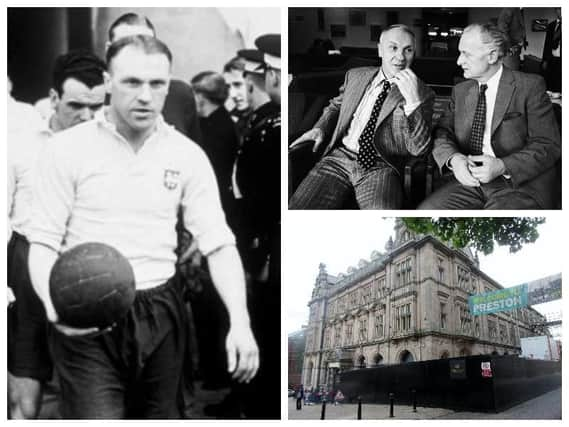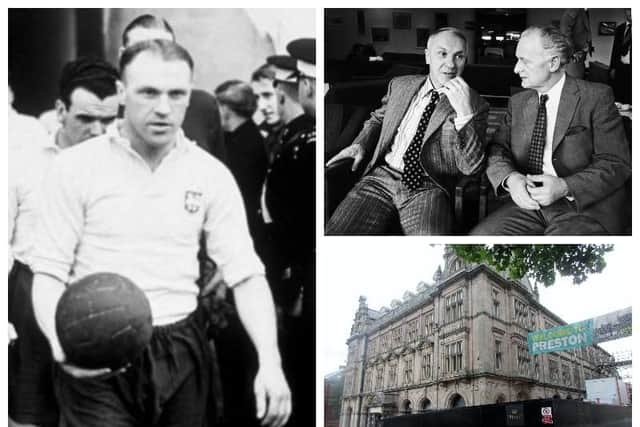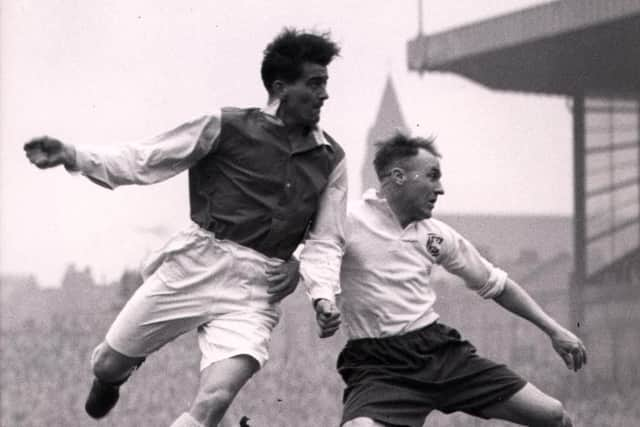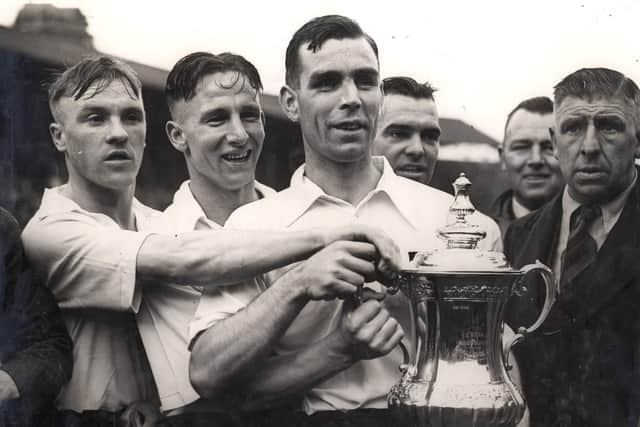Football legend Bill Shankly whose name lives on in Preston where he rose to stardom


If you walk through the Preston’s Market Square these days you will spot the grand old General Post Office building is being converted into a hotel.


Bill Shankly, who had begun his career at Carlisle United, was signed by PNE in 1933 for a nominal transfer fee of £500 and on a weekly wage of £5.
Advertisement
Hide AdAdvertisement
Hide AdAfter impressing in the Central League with the reserves he made his first team debut, aged 20, in December 1933 in a 5-0 victory of Hull City at Deepdale. He went on to make that right half position his own, not missing a single league or cup match before the season’s end.
In dramatic fashion PNE clinched promotion to the First Division as runners-up on the final day with a 1-0 victory at Southampton with a late winner from John Palethorpe, who had been injured and limping down the wing in the closing stages.
That half-back line of Shankly, Bill Tremelling and Jimmy Milne proved to be a formidable one and played together for most of the following season in the top flight where they finished in mid-table and reached the sixth round of the FA Cup for the second season running.


The following season 1935/6 after a poor start, due to an awful run of seven successive away defeats, the team soared up the league table and finished 7th in the First Division with Shankly missing only one fixture.
Advertisement
Hide AdAdvertisement
Hide AdThe season 1936/7 saw North End on occasions field an all Scottish forward line of Willie Fagan, Frank O’Donnell, Jimmy Maxwell, Jimmy Dougal and Hugh O’Donnell.
While not Shankly’s best season for consistency he still managed to play 29 league games and in every round of an FA Cup run that only ended at Wembley with a 3-1 defeat against Sunderland in the cup final.
The following season Shankly was back to his very best, playing all but one league match. North End, after bringing in Bobby Beattie, Jimmy McIntosh, Dick Watmough and George Mutch, finished third in the First Division, narrowly missing out on the title behind Arsenal and Wolverhampton Wanderers. Most important of all was their run to the FA Cup final with an ever-present Shankly forming a formidable half back line alongside Tom Smith and Jimmy Milne. Unfortunately, injury denied Milne his place at Wembley against Huddersfield Town with the able Bob Batey deputising. That team’s finest hour being crowned by a last-minute penalty kick by George Mutch to clinch FA Cup glory in 1938.


In early April Shankly had been one of the four PNE players in the Scotland team which defeated England at Wembley by 1-0 in a Home International fixture.
Advertisement
Hide AdAdvertisement
Hide AdIn 1939, the hope of further FA Cup glory began with a 4-2 win at Runcorn and ended with a 1-0 defeat at Portsmouth in the quarter-final as the victors went on to win the FA Cup. Shankly missed only two matches all season with North End finishing in ninth position in the league table. After only three league matches of the 1939/40 season the Football League programme was abandoned as war was declared.
It was time for the PNE players to play their part for their country. Within months Harry Holdcroft, Frank Gallimore, Bob Batey, George Mutch, Jimmy Dougal, Jack Wharton and Willie McIntosh had taken up a variety of occupations in local engineering factories, Hunter with his electrical skills was working at a coal mine and Jimmy Milne and Tom Smith could be seen on the streets in the blue uniform of the police war reserve.
Andy Beattie had joined the Army and Bobbie Beattie had joined the RAF as had Bill Shankly, all three Scottish internationals ready to fight for their country.
The years of the Second World War saw regional leagues formed and clubs use guest players as appropriate. The highlight locally being North End’s appearance in the wartime League Cup of 1941 in which they defeated Arsenal 2-1 in a replay at Blackburn. Together in that side were Bill Shankly and a youthful Tom Finney. Shankly looking resplendent in his Royal Air
Advertisement
Hide AdAdvertisement
Hide AdForce blue uniform (pictured inset) was working elsewhere in Lancashire as a member of the balloon squadron and managed to combine his job with his passion for football. Posted to various locations in the UK besides playing for the RAF squadron teams he turned out for a number of clubs in the wartime fixtures including Cardiff City, Liverpool, East Fife and Arsenal, while based at Henlow.When the war was over and the Football League began again in August 1946 PNE faced Leeds United at Deepdale in their opening fixture. Four players, Andy
Beattie, Bobbie Beattie, Jimmy Dougal and Bill Shankly, who had played for PNE before the war were in the line up again after seven long years, along with Tom Finney, who was making his league debut.
Shankly played at centre half and Finney scored in a 3-2 victory watched by more than 25,000 spectators. Amazingly, Shankly who reverted to his right half back role for the next game played all but one of the league fixtures as PNE finished seventh in the First Division and all of the FA Cup ties, including a quarter-final defeat 2-1 away at Charlton.
In season 1947/8 North End finished in seventh place again and once more reached the quarter-finals of the FA Cup before losing away to Manchester United by 4-1. As in the previous season when he scored three penalties Shankly proved to be deadly from the spot, netting six penalties. Unfortunately, his long run as a regular in the team was coming to an end with Ken Horton replacing him in the closing weeks.
Advertisement
Hide AdAdvertisement
Hide AdIn the 1948/9 season Shankly played second fiddle to Horton and the club had a shocking season, being relegated despite the fact Finney was playing a more prominent part.
Time had caught up with the veteran Shankly and he was not retained, departing Deepdale to become manager of Carlisle United, a Third Division North side. While there he transformed a struggling team into promotion chasers who narrowly missed out in season 1950/1 finishing in third place.
From Carlisle he moved to Grimsby Town, where once again he narrowly missed out on promotion, but proved his motivational ability again. By January 1954 he had moved on again to Workington Town, where he saved them from applying for re-election and followed that up with an eighth place finish, despite working with a shoestring budget.
In November 1955 his old team mate Andy Beattie, the manager of Huddersfield Town, invited him to join him in Yorkshire. After a poor start to the 1956/7 season following relegation from the First Division Beattie resigned in November and Shankly took over.
Advertisement
Hide AdAdvertisement
Hide AdDespite his best efforts Shankly could only achieve mid-table finishes in his three seasons in charge of a club he felt lacked ambition. An approach in November 1959 by Liverpool, who were languishing in the Second Division, was too tempting to resist and he began his glorious reign at Anfield. In those days only the top two teams were promoted and twice his rebuilt Liverpool side finished third before they won the Second Division title in season 1961/2 as Roger Hunt netted 41 goals.
What followed was an amazing chapter in the history of Liverpool FC with League Championship and FA Cup success alongside adventures in Europe.
His glorious Anfield reign came to an end in July 1974 when the manager of the FA Cup holders shocked everyone by announcing his retirement aged 60.
Shankly who died in September 1981, aged 68, had enjoyed an amazing football career and had touched the lives of so many Preston and Liverpool folk with his enthusiasm and determination.